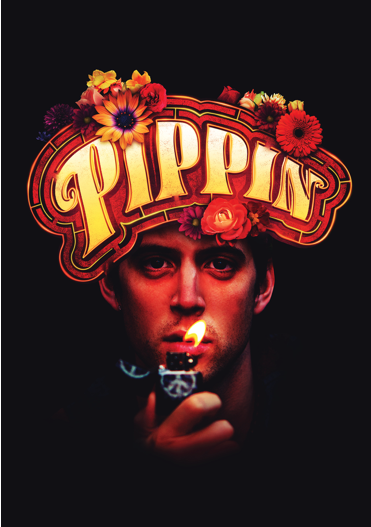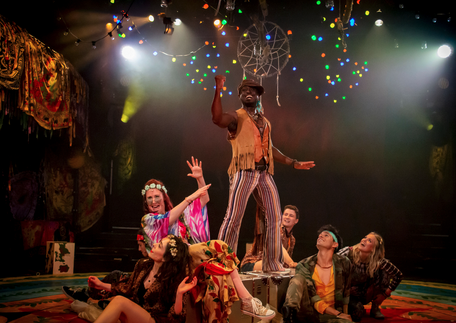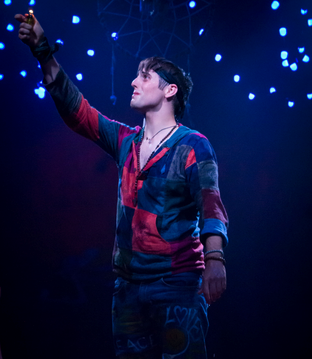
Stephen Schwartz and Roger O. Hirson’s 1972 Broadway musical Pippin has long been a personal obsession of mine. So it may be difficult for me to be truly objective about it. But I’ve seen Pippin’s that are dire (as at the Menier in 2011, which re-conceived it as a computer game playing out in Pippin’s mind) and dazzling (as on Broadway in 2013, where director Diane Paulus transformed it into a live circus show).
It’s wonderful when you discover someone who is as similarly obsessed with a classic show as you are, and in the case of the current production, it is both the director Steven Dexter (directing his fourth staging of the show, after two previous outings with students and a professional one in a Vauxhall pub beer garden last year in between lockdowns that this new production is now based on, though only Ryan Anderson in the title role and Daniel Krikler as his father Charles survive of its then-cast of six) and producer Adam Blanshay (on his third association with it).

This pared-down version, now upping the cast size to eight members, reclaims the show again and reignites it with the spirit of the 60s when it was originally conceived and first produced by composer Stephen Schwartz when he was still a student at Carnegie Mellon in 1967.
It’s a show that, as the opening number always promises, has “magic to do, just for you”; and that promise is gloriously fulfilled here, in a staging of nuance, rippling energy and heartbreaking pathos, too.
One of the reasons I am particularly drawn to the show is that I see it as a parable about suffering from overpowering depression — and overcoming it. Pippin is facing an existential crisis, about the purpose and point of his life; and as he seeks to resolve it, there are voices — in the shape of the malignant ‘leading player’, who is driving him to perform the ultimate finale: his suicide. But he is led out of this despairing maze by finding the comforts of family life: it may sometimes seem banal (like dealing with the heartbreak of a child who loses a beloved pet duck), but it is about a shared humanity, not narcissistic self-obsession.
The production is also vividly re-imagined as a child of the 60s: as designed by David Shields, with tie-dye drapes over every wall and a giant sun on the stage floor, this could equally double as a set for Hair. Director Dexter admits to being inspired by the latter in his version set at the time the show was first conceived by Schwartz: “Flower power was at its peak, war was raging in Vietnam and Hair opened on Broadway. It was the year of The Summer of Love. My take on the show (which I have been lucky to direct three times before) is told by a group of hippie travellers of that time.”

And with Nick Winston’s energetically athletic Fosse-esque choreography, which is led by an insinuatingly creepy but charismatic leading player from Ian Carlyle (pictured above with the company; all pics by Edward Johnson), I was reminded, too, of Sammy Davis Jr’s stunning Rhythm of Life number from the 1969 film version of Sweet Charity that was directed and choreographed by Fosse, and predated his work on Pippin. (It was refreshing, too, to see a male leading player, after the most recent productions I’ve seen — on Broadway and at Southwark Playhouse in a transfer from Hope Mill — have re-gendered the role as female).

Ryan Anderson — who played the title role in last year’s post-first lockdown production at Vauxhall’s temporary Garden Theatre — reprises it in a beguilingly agile and moving performance. (You can watch him performing Corner of the Sky, of my all-time favourite theatre songs, here)
I also adored Natalie McQueen’s utterly bewitching Catherine — usually a drippy part but here performed by a palpable sincerity and heartache — and Jaydon Vijn’s touching Theo, the widow and her young son whose family Pippin becomes part of.
The show also has show-stopping turns from Gabrielle Lewis-Dodson as Pippin’s stepmother Fastrada, who performs the Act One closer Spread a little Sunshine with real joy, and Genevieve Nicole as Berthe, whose No Time at All is a fierce cry for carpe diem — to seize the moment and live for today: “It’s time to start living/ Time to take a little from this world we’re given/ Time to take time, cause spring will turn to fall / In just no time at all….”
That’s a forever-relevant message. So, in facing off depression, is this:
“So when the drearies do attack/ And a siege of the sads begins/ I throw these regal shoulders back/ And lift these noble chins // Here is a secret I never have told/ Maybe you’ll understand why/ I believe if I refuse to grow old/ I can stay young till I die”
This is a musical that keeps me young. And this production is really life-affirming.
